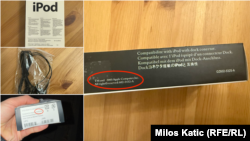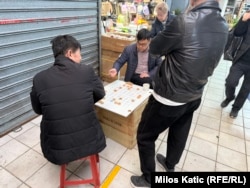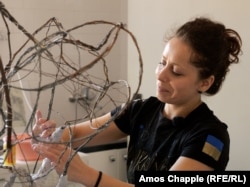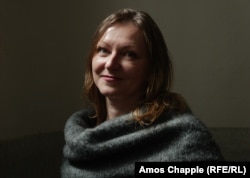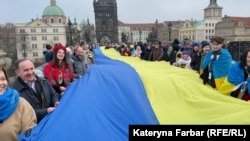Europe
Mourners Honor US Soldiers Who Died In Lithuania Training Exercise
Mourners gathered at the US Embassy in Lithuania on April 1 to honor four American soldiers who died after their M88 Hercules armored recovery vehicle became submerged in a peat bog during a training exercise. The military announced on March 31 that they found three victims inside the vehicle after an intensive six-day search by US, Lithuanian, Polish, and Estonian rescue teams. A fourth soldier was found the next day.
EU Lawmakers Debate Support For RFE/RL Amid US Funding Freeze
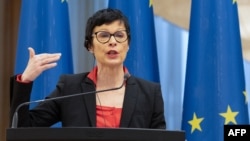
European Commissioner for Enlargement Marta Kos has emphasized the “need to protect Radio Free Europe/Radio Liberty (RFE/RL),” warning that "if we don’t, we hand a gift to autocrats the world over."
Her remarks came during a debate in the European Parliament plenary in Strasbourg on April 1 that focused on safeguarding access to democratic media, including RFE/RL.
The debate was initiated in response to an executive order signed by US President Donald Trump on March 14, which reduced the size of the US Agency for Global Media (USAGM), the body overseeing RFE/RL.
Shortly afterward, Kari Lake, a senior adviser to the USAGM CEO, issued a letter stating that the Congress-approved grant funding the broadcaster had been terminated.
While the grant termination has since been rescinded, the USAGM has not sent any of the congressionally appropriated funds, prompting RFE/RL to furlough some of its staff on April 1.
Kos, speaking on behalf of the EU foreign policy chief Kaja Kallas, said that “the European Union needs to be a refuge for independent media, including from Russia and Belarus, so they can continue their work; holding their political and business elites to account and exposing corruption.”
While the commissioner refrained from speaking about the potential of the EU stepping in to fund the media organization, several members of the European Parliament did mention the idea.
Stormy Discussion
Sebastiao Bugalho, a Portuguese member of the largest group in the chamber, the center-right European People’s Party, said that “we will pay the price and shoulder the burden.”
Lithuanian lawmaker Virginijus Sinkevicius from the Greens underlined that “we must ensure that RFE/RL has access to long-term and stable funding, including from the EU.”
Alexandr Vondra, who was a prominent dissident in communist Czechoslovakia and is now a Czech MEP from the right-wing European Conservatives and Reformists, said that the radio helped spread information in repressive countries such as Iran, Belarus, and Russia, and called on the European Union to contribute to the station’s finding.
“Let us be open to finance [RFE/RL] also from EU money and find agreement on what form,” he said.
The one-hour debate became rather stormy at times with lawmakers shouting at each other in between speeches.
Several members from populist groups in the Strasbourg chamber spoke against potentially using EU money to finance the broadcaster.
Mary Khan, an MEP from the far-right Alternative for Germany party, said that RFE/RL “can finance itself” and added that “media should not be financed by European institutions.”
Slovak MEP Milan Uhrik, who belongs to the same Europe of Sovereign Nations Group as Khan, said that the EU should instead help farmers in Slovakia battling foot-and-mouth disease among its cattle, adding that “your independent media is the absolute opposite of independent media.”
Julien Sanchez, a French parliamentarian belonging to the Patriots for Europe, another populist right-wing fraction, said that the chamber was “hypocritical” in talking about this situation and “interfering with the situation in the United States.”
The debate will have no resolution to be voted on during this plenary session, which ends on April 3, but this could come at a later stage as several European parliamentary officials told RFE/RL that the house will continue to monitor the situation.
EU Faces Crossroads On Russia Sanctions As Rubio's NATO Debut Looms
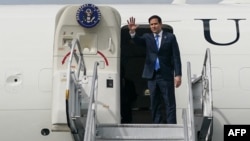
Welcome to Wider Europe, RFE/RL's newsletter focusing on the key issues concerning the European Union, NATO, and other institutions and their relationships with the Western Balkans and Europe's Eastern neighborhoods.
I'm RFE/RL Europe Editor Rikard Jozwiak, and this week I am drilling down on two issues: When Russia could get sanctions relief and Marco Rubio's first NATO ministerial.
Briefing #1: EU Won't Lift Sanctions On Russia -- Yet
What You Need To Know: In recent weeks, the United States, Russia, and Ukraine have been sketching out cease-fire frameworks: one aimed at protecting energy infrastructure like power plants and transmission lines and another focused on reducing military activity in the Black Sea.
One of Moscow's big asks has been publicly communicated: sanctions relief. In a Kremlin statement issued after the Black Sea cease-fire agreement on March 25, Moscow declared it would only observe the deal if the West partially lifted sanctions imposed following its full-scale invasion of Ukraine more than three years ago.
This demand includes lifting restrictions on fertilizer exports and the insurance companies that cover them, as well as reconnecting several Russian banks to the SWIFT global payment system.
Several EU leaders have already dismissed Moscow's request, most notably during a March 27 meeting in Paris , where top officials from more than 30 countries gathered to discuss security guarantees for Ukraine.
When I spoke with numerous European diplomats, they all pointed out that the White House statement released the same day made no mention of sanctions relief.
As one EU ambassador put it to me, referring to the recent cease-fire talks in Riyadh: "No deal was made on this in Saudi Arabia, so therefore nothing to decide for us."
Deep Background: The Europeans have obviously not been present at the cease-fire talks, but they do have a rather large say on Russia sanctions.
SWIFT is a Belgian company, for starters, and the EU has "de-SWIFTed" 23 Russian banks so far, including big ones such as Sberbank and Bank Otkritie.
They are also aware that Russia's trade relations with Europe run deeper than they do with the United States.
Even before the full-scale invasion, US exports to Russia amounted to less than 0.5 percent of total American worldwide exports. For the EU, that figure was 6 percent, which is equivalent to 250 billion euros ($272 billion).
So, when wide-ranging EU sanctions were imposed, it hit Moscow harder. The EU's sanctions czar, David O'Sullivan, estimates that restrictive measures have deprived Russia of more than 450 billion euros ($490 billion) in revenue since early 2022.
So, are the Europeans considering even a partial easing of sanctions on Russia?
The answer I consistently hear is a simple "no" or "we will decline this."
Officials point to Russia's ongoing drone and missile attacks on Ukraine, as well as the conclusions of a recent EU gathering, which signaled a potential ramping up of measures rather than a relaxation of pressure. As the Main Results of the March 20 European Council meeting on Ukraine put it: "The European Union remains ready to step up pressure on Russia, including through further sanctions and by strengthening the enforcement of existing measures."
The European Commission has not yet invited EU member states for so-called sanctions confessionals to discuss a new sanctions package, which would be the 17th in three years, but they are looking into things like closing sanctions circumvention loopholes.
Drilling Down
- The conclusions of the European Council meeting on March 20 were approved by 26 out of 27 EU member states. The one not aligning? Hungary, which for a long time has been critical of EU sanctions .
- This is significant for one reason: lifting EU sectoral sanctions requires unanimity, and that simply doesn't exist right now. As noted above, many member states are calling for more sanctions, not fewer. But here's the catch: Every six months, in January and July, the entire sanctions package must be extended -- and that also requires unanimous approval.
- It is here where Hungary, and potentially others, might want to come in and start scaling down. In January, Budapest was threatening the entire rollover and only gave the green light after getting written assurances that Russian oil would continue to flow into Hungary.
- EU diplomats I've spoken to are already fearing what the July sanctions extension might look like and what concessions they may have to make to secure a rollover as a whole.
- The regular EU summit at the end of June will likely involve intense horse-trading on this, with Hungary eyeing more frozen EU funds for itself and several member states eager to launch EU accession talks with Kyiv by the summer -- a move Budapest has blocked so far.
- De-SWIFTing some banks and allowing Russian fertilizers into the bloc again are obviously low-hanging fruit in this regard. But this will, of course, depend on what the situation looks like on the ground in Ukraine at that time.
- One thing is clear, however: Despite immediate rejections from European diplomats, Moscow has planted a seed. As one European diplomat put it to me: "I believe it is a smart salami method the Russians have started here. Already into the cease-fire talks, they bring far-reaching demands that, in fact, belong more in a comprehensive peace deal discussion. It should be us this time who are 'transactional' and give this powerful tool away only for a fair price."
- So what could this fair price be? In a sense, European officials will look to Kyiv to provide the answer. But according to those I've spoken with, the contours could include limited sanctions relief in exchange for freezing the front lines, no recognition of occupied territories as Russian, and continued Western military deliveries to Ukraine, with the snapback option of sanctions if breaches occur. The question is whether Brussels and Kyiv can get Moscow to agree to such a deal and what the United States will think of it.
Briefing #2: Rubio Comes To Brussels
What You Need To Know: On April 3-4, NATO foreign ministers will gather in Brussels for their regular spring meeting.
Much like the defense ministerial in February, all eyes will be on the American representative. Then, it was Defense Secretary Pete Hegseth; this time, it's Secretary of State Marco Rubio.
When Rubio was first slated for the role in the new Trump administration, most Europeans rejoiced. He was seen as an ardent "transatlanticist."
Now, there is a certain nervousness, according to NATO diplomats I have spoken to.
While some say, "He still gets us and the alliance," they wonder what influence he really has within the US government and what he will say when it comes to Ukraine, Russia, and China.
Two things, however, are apparent.
Just like Hegseth, Rubio will hammer home the message that European allies need to step up on defense spending and burden sharing.
And, just like in February, the allies will hope that the United States reconfirms its commitment to NATO and its mutual defense clause, Article 5.
Since the only other NATO gatherings before the alliance's June summit are an informal foreign ministers' meeting in Turkey in mid-May and a defense ministers' session in early June, this week's meeting serves very much as a dress rehearsal for the summit in The Hague on June 24-26.
The goal for that meeting is clear: Keep the alliance together by ramping up defense spending considerably.
NATO Secretary-General Mark Rutte is pushing for every ally to commit to spending at least 3.7 percent of gross domestic product on defense as quickly as possible and with regular progress reports.
This push is aimed at placating US President Donald Trump at the summit, but some European allies will be reluctant to commit too much on defense too soon given they are struggling with low growth and ballooning budget deficits.
Deep Background: Perhaps the one thing to look out for during the ministerial is the session devoted to NATO-EU relations, with the latter being represented by the European bloc's foreign policy chief, Kaja Kallas.
Rubio snubbed Kallas when she traveled to the United States earlier this year, and all EU diplomats I have spoken to admit that Washington doesn't see the EU as a serious interlocutor.
There is also plenty of tension, not least when it comes to the European Commission's latest defense spending proposal: a potential 150 billion euro ($163 billion) loan for EU member states to buy arms, though not from non-European countries. The United States is especially wary of any moves that would lock it out of a European defense-spending splurge.
But the biggest irritant, of course, is the fraying relationship on trade.
Just one day before the NATO meeting, the United States is set to impose a 25 percent tariff on all vehicle imports, a move that will hit countries like Germany especially hard. This follows existing US duties on European steel and aluminum, which Brussels is planning to counter with retaliatory measures on April 13.
Drilling Down
- Another guest at the ministerial is Ukrainian Foreign Minister Andriy Sybiha. An update on the situation on the battlefield is expected but, again, it will be Rubio who is in the spotlight. Will the United States increase pressure on Russia in case the cease-fire deals concerning infrastructure and Black Sea traffic aren't holding?
- While Ukraine's membership in the alliance is off the table for now, most European allies are keen to at least get assurances that US weapons will continue to go to Ukraine and that NATO's training mission for Ukrainian soldiers, NSATU, continues to operate. So far, everything is still working. There also haven't been any changes when it comes to US troop posture on NATO's eastern flank.
- What has changed, however, is that the United States is no longer chairing the Ukraine Defense Contact Group, known as the Ramstein group, which coordinates military support for Kyiv. The United Kingdom already chaired the last meeting of the group in February, and the next one tentatively scheduled for April 11 could be co-chaired by the UK and France.
- Expect London and Paris to also continue working, at least on the sidelines of the ministerial, on a potential reassurance force in Ukraine should a permanent cease-fire take hold. However, details such as troop numbers, participating countries, and the exact mandate will have to remain sketchy for now.
- What's become increasingly apparent is that work on a new NATO strategy for Russia has stalled. The strategy -- defining how the alliance should engage with Moscow going forward -- was supposed to be endorsed at the Hague summit. But Washington has indicated that it wants to avoid introducing potential "irritants" on the path to a final peace deal, and such a strategy document could be exactly that.
- Finally, the foreign ministers of NATO's four Asia-Pacific partners -- Australia, Japan, New Zealand, and South Korea -- will also be participating in a session at the explicit request of the United States. While the US administration sees Beijing as a rival, its public criticism of China has so far been relatively muted. In this session, ministers will be keen to hear Rubio's take on how to approach a range of China-related issues.
Looking Ahead
Look out for the first ever EU-Central Asia leaders' summit in Samarkand, Uzbekistan, on April 4. European Council President Antonio Costa and European Commission President Ursula von der Leyen will meet with the presidents of Kazakhstan, Kyrgyzstan, Tajikistan, Turkmenistan, and Uzbekistan to discuss issues that include energy cooperation, Russian sanctions circumvention, and expanding trade opportunities.
That's all for this week! Thank you all for your wonderful feedback on last week's issue .
Feel free to reach out to me on any of these issues on Twitter @RikardJozwiak, or on e-mail at jozwiakr@rferl.org .
Until next time,
Rikard Jozwiak
If you enjoyed this briefing and don't want to miss the next edition subscribe here .
'Made In CalifoMia': How Chinese Knock-Offs Of Western Brands Hit Balkan Shelves

NOVI SAD, Serbia -- On the shelves in one of the many Chinese-owned stores here in Serbia's second-largest city are earbuds packed in a white cardboard box that reads "iPod."
Customers might think they're getting something produced by US electronics giant Apple. But eagle-eyed buyers might notice something else is off besides the cut-rate price -- just under $2 -- for such earbuds, which typically cost around $20 in Serbia.
The box reads "Apple Earphone" -- in the singular, rather than plural. And it says the contents were "made in Califomia" -- with "m" instead of "rn" in the name of the state where Apple is headquartered.
The earbuds are among the flood of Chinese-made goods masquerading as famous Western brands that have poured into the Balkans and crowded shelves in shops owned by Chinese immigrants that have mushroomed across the region in recent years.
There is no exact data on the total volume of Chinese goods shipped into the Balkans for sale as counterfeit Western products, which include not only fake Apple electronics but also shoes, clothing, and products billed as global brands like Nike, Tommy Hilfiger, Adidas, Hugo Boss, Armani, Gucci, and Louis Vuitton.
But customs data suggests the number runs at least in the hundreds of thousands of units annually, and RFE/RL's Balkan Service has established at least one route by which these products make it to Balkan store shelves -- including a stopover in an Italian port with notorious mafia connections.
A Serbia-based Chinese businessman who was until recently active in the import-export business said that around 85 percent of these goods that arrive in Serbia are shipped from the port of Ningbo on China's eastern seaboard.
Up to 2,000 items can be transported per container, making control of each item difficult, the businessman said on condition of anonymity due to possible legal repercussions.
"Customs cannot check every container and every product," he said.
The wholesale purchase of these counterfeit items is typically conducted with cash and between parties who know one another and have longstanding business relations, he added.
The businessman said that from Ningbo, goods are shipped to the Italian port of Gioia Tauro in Italy. From there, he said, counterfeit goods are transferred in smaller ships to ports in Rijeka, Croatia; Bar, Montenegro; and Kopar, Slovenia.
RFE/RL's Balkan Service independently corroborated this route with customs authorities in Serbia, Croatia, Montenegro, and Italy.
After reaching Slovenia, Croatia, or Montenegro, the counterfeit goods are then transported to Serbia via road and rail, the Serbian Customs Administration told RFE/RL.
The agency said that last year alone its officers seized 104,000 products due to suspected intellectual property rights violations, while more than 61,000 items were destroyed -- mostly textiles.
Croatian customs officials told RFE/RL that they handle around 600 cases of suspected intellectual-property infringement cases annually, primarily at ports in Rijeka and Ploce but also at the Bajakovo border crossing with Serbia. Around 85 percent of these goods come from China, and the majority of the goods are counterfeit EU and US brands, they said.
The Montenegrin Customs Administration told RFE/RL that China remains a key country of origin for all types of counterfeit goods. Montenegrin customs officers last year seized 5,274 counterfeit items from China, up from 3,303 the previous year, it said.
The Chinese Connection
The Balkans region has become strategically important for China, which has invested in massive infrastructure projects there and signed a free-trade agreement with Serbia that has been in place since July 2024.
A majority of the Balkan countries are not members of the European Union but are part of China's Belt and Road Initiative (BRI), a global infrastructure development strategy launched by Beijing in 2013 that some Western governments warn could lead to excessive debt to China.
Chinese exports to Serbia rose an average of 16.7 percent annually from 2018 to 2023, jumping from $1.8 billion to nearly $4 billion in that period, according to the most recent data from the Observatory of Economic Complexity, a trade data platform.
Among dozens of China-based companies offering their products to the Balkan market through local Serbian companies is Shenzhen VBO Industrial Co., which produced earbuds that appear identical to those in the counterfeit Apple box in the Novi Sad shop visited by reporters. The company did not respond to a request for comment about its products being sold under the Apple brand.
Based in the Tianan Cyber Industrial Park in the city of Shenzhen in southeastern China, the plant covers 6,000 square meters and specializes in producing audio equipment.
Shenzhen VBO Industrial's website lists the price for the earbuds that reporters bought in the Novi Sad shop as $0.69-$0.99, and they are sold in a box without an Apple label. It is unclear whether the headphones that reporters found in Novi Sad were bought directly from the Chinese firm or from intermediaries in Serbia.
In neighboring Bosnia-Herzegovina, RFE/RL's Balkan Service visited Chinese-owned stores and observed other counterfeit US brands, including Nike sneakers for $20 and Tommy Hilfiger shirts for $11 -- significantly cheaper than the originals.
'Low Risk, High Profit'
RFE/RL's Balkan Service sought comment from the Italian financial police -- the Guardia di Finanza -- about Italy's role as a stopover for counterfeit Chinese goods that are shipped on to the Balkans.
Officials there responded with an October 2023 press release describing an "illegal assembly line" of counterfeit products involving Italian and Chinese organized crime -- and indicating that counterfeit labels and packaging are added to some of these goods after arrival from China.
Italian financial police did not respond to specific questions about Gioia Tauro, the port in the Italian province of Calabria that the Serbia-based Chinese businessman called a key stopover for counterfeit goods coming to the Balkans from China.
But the Gioia Tauro port is known as a hub for drug trafficking allegedly linked to the the notorious Italian crime syndicate known as the 'Ndrangheta.
Italian authorities in 2022 and 2024 said they uncovered 'Ndrangheta-linked criminal networks suspected of smuggling hundreds of millions of euros' worth of cocaine into Europe through Gioia Tauro, an operation that allegedly involved corrupt port employees.
Ruggero Scaturro, a senior analyst with the Switzerland-based NGO Global Initiative, described Gioia Tauro as the place where the legal and illegal intertwine under the firm grip of the ‘Ndrangheta.
"In essence, Gioia Tauro operates in a dual reality: a major commercial hub where anyone can theoretically trade, but one where the rules of access for illicit goods are dictated by the ‘Ndrangheta," Scaturro, whose organization monitors global organized crime worldwide, told RFE/RL.
He underlined that between Asia, the Middle East, and the EU, the Balkan region functions as a natural gateway for goods moving westward and that it remains a key distribution point.
"Counterfeit trafficking is rarely an isolated business but is often managed by the same criminal networks that control other illicit businesses," Scaturro said.
"The appeal is clear: While drug trafficking carries severe legal consequences, counterfeit smuggling remains a relatively low-risk, high-profit enterprise, making it a lucrative secondary business for these groups," he added.
Russia Wants Sanctions Lifted In Exchange For A Cease-Fire. The EU Isn't Ready To Do That.
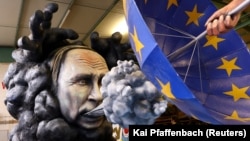
In recent weeks, the United States, Russia, and Ukraine have been sketching out cease-fire frameworks -- one aimed at protecting energy infrastructure like power plants and transmission lines and another focused on reducing military activity in the Black Sea.
One of Moscow's big asks has been publicly communicated: sanctions relief. In a Kremlin statement issued after the Black Sea cease-fire agreement on March 25, Moscow declared it would only observe the deal if the West partially lifted sanctions imposed following its full-scale invasion of Ukraine more than three years ago.
This demand includes lifting restrictions on fertilizer exports and the insurance companies that cover them, as well as reconnecting several Russian banks to the SWIFT global payment system.
Several EU leaders have already dismissed Moscow's request, most notably during a March 27 meeting in Paris, where top officials from more than 30 countries gathered to discuss security guarantees for Ukraine.
When I spoke with numerous European diplomats, they all pointed out that the White House statement released the same day made no mention of sanctions relief.
As one EU ambassador put it to me, referring to the recent cease-fire talks in Riyadh: "No deal was made on this in Saudi Arabia, so therefore nothing to decide for us."
EU Trade Relations With Russia
The Europeans have obviously not been present at the cease-fire talks, but they do have a rather large say on Russia sanctions.
SWIFT is a Belgian company, for starters, and the EU has "de-SWIFTed" 23 Russian banks so far, including big ones such as Sberbank and Bank Otkritie.
They are also aware that Russia's trade relations with Europe run deeper than they do with the United States.
Even before the full-scale invasion, US exports to Russia amounted to less than 0.5 percent of total American worldwide exports. For the EU, that figure was 6 percent, which is equivalent to 250 billion euros ($272 billion).
When wide-ranging EU sanctions were imposed, it hit Moscow harder. The EU's sanctions czar, David O'Sullivan, estimates that restrictive measures have deprived Russia of more than 450 billion euros ($490 billion) in revenue since early 2022.
Are the Europeans considering even a partial easing of sanctions on Russia?
The answer I consistently hear is a simple "no" or "we will decline this."
Officials point to Russia's ongoing drone and missile attacks on Ukraine, as well as the conclusions of a recent EU gathering, which signaled a potential ramping up of measures rather than a relaxation of pressure.
As the Main Results of the March 20 European Council meeting on Ukraine put it: "The European Union remains ready to step up pressure on Russia, including through further sanctions and by strengthening the enforcement of existing measures."
The European Commission has not yet invited EU member states for so-called sanctions confessionals to discuss a new sanctions package, which would be the 17th in three years, but they are looking into things like closing sanctions circumvention loopholes.
Lifting EU Sanctions Requires Unanimity
The conclusions of the European Council meeting on March 20 were approved by 26 out of 27 EU member states. The one not aligning? Hungary, which for a long time has been critical of EU sanctions.
This is significant for one reason: Lifting EU sectoral sanctions requires unanimity -- and that simply doesn't exist right now. As noted above, many member states are calling for more sanctions, not fewer. But here's the catch: Every six months, in January and July, the entire sanctions package must be extended -- and that also requires unanimous approval.
It is here where Hungary, and potentially others, might want to come in and start scaling down. In January, Budapest was threatening the entire rollover and only gave the green light after getting written assurances that Russian oil would continue to flow into Hungary.
EU diplomats I've spoken to are already fearing what the July sanctions extension might look like and what concessions they may have to make to secure a rollover as a whole.
The regular EU summit at the end of June will likely involve intense horse-trading on this, with Hungary eyeing more frozen EU funds for itself and several member states eager to launch EU accession talks with Kyiv by the summer -- a move Budapest has blocked so far.
De-SWIFTing some banks and allowing Russian fertilizers into the bloc again are obviously low-hanging fruit in this regard. But this will, of course, depend on what the situation looks like on the ground in Ukraine at that time.
One thing is clear, however: Despite immediate rejections from European diplomats, Moscow has planted a seed. As one European diplomat put it to me: "I believe it is a smart salami method the Russians have started here. Already into the cease-fire talks, they bring far-reaching demands that, in fact, belong more in a comprehensive peace deal discussion. It should be us this time who are 'transactional' and give this powerful tool away only for a fair price."
So what could this fair price be? In a sense, European officials will look to Kyiv to provide the answer. But according to those I've spoken with, the contours could include limited sanctions relief in exchange for freezing the front lines, no recognition of occupied territories as Russian, and continued Western military deliveries to Ukraine, with the snapback option of sanctions if breaches occur.
The question is whether Brussels and Kyiv can get Moscow to agree to such a deal and what the United States will think of it.
What's Left For Marine Le Pen And France's Far Right After Embezzlement Sentence?
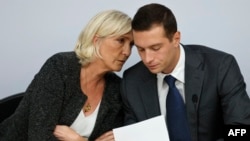
The French far-right politician Marine Le Pen has been found guilty of embezzling European Parliament funds over a 12-year-period. In a ruling that will shake both French and European politics, the Paris court ruled that she is ineligible from running for any political office with immediate effect -- meaning she most likely is out of the presidential race that is scheduled to take place in the spring of 2027 at the latest.
She left the courtroom without comment. While she can appeal the ruling, any such step could take years -- potentially spelling the end of her political career.
Le Pen, who faced a run-off against current President Emmanuel Macron in both the 2017 and 2022 races, was considered the early favorite to become the Fifth Republic’s first female president.
Already in 2022, she received 41.5 percent in the second round, the best score ever of the French far right in a presidential bid.
With Macron barred from running for a third term, Le Pen was set to be the most recognizable face in the upcoming elections, and early polls indicated she would beat any presumptive candidate from the mainstream left or right.
Whitewashing The National Front
Le Pen took over the National Front from Jean-Marie Le Pen back in 2011, rebranded it National Rally, and tried to whitewash its image by distancing the party and herself from some of her father’s more openly racist and antisemitic past.
She has remained highly critical of immigration and Islam and wants to take France out of NATO's integrated military command.
However, she has backtracked on her previous promises to take the country out of the EU and the eurozone.
Her party was granted a much-publicized loan by a Russian bank back in 2014, and while she has been widely supportive of Moscow in the past and criticized the EU’s sanctions against the Kremlin, she has been supportive of France accepting Ukrainian refugees.
Following the March 31 ruling, the Kremlin said it "deplored the violation of democratic norms."
European officials, speaking under condition of anonymity, had hoped she would potentially moderate further in office, following perhaps in the footsteps of right-wing Italian Prime Minister Giorgia Meloni, who largely has been seen as competent and cooperative in Brussels.
They did, however, cautioned that the National Rally always has positioned itself farther to the right and is a key founder of the Patriots for Europe political family together with the Hungarian ruling party Fidesz, whose leader, Viktor Orban, immediately voiced his support for Le Pen on X.
The question is what will happen to her party now.
Eight other former members of the European Parliament from the National Rally were sentenced alongside Le Pen of diverting millions of euros from European Parliament funds to pay France-based staff between 2004 and 2016, prompting the question of whether the movement can survive such a blow.
What's Next For France's Far Right?
Jordan Bardella -- who took over as the official National Rally leader back in 2021 and has been groomed as Le Pen's natural successor -- remains directly untainted by the scandal.
But can Bardella muster the same pulling power as Le Pen? Only 29, he is seen as too young and too inexperienced. While the National Rally managed to finish first in European Parliament elections in last June, the party's failure to repeat that success in national parliamentary elections later that summer raises questions about his standing.
It remains to be seen how the electorate will respond to the ruling. Many European politicians were shocked by the stinging criticism from US Vice President JD Vance earlier this year over the cancellation of the first round of Romania's presidential election in December following allegations of Russian interference on behalf of independent candidate Calin Georgescu, who surprisingly finished first.
We can expect a similar blowback this time as many on the populist right will brand this "lawfare" against politicians who aren't considered politically mainstream, and Marine Le Pen has just become their "cause celebre par excellence" who can propel them to score even higher grievance votes going forward.
If Peace Returns To Ukraine, What Next For Europe's Millions Of Refugees?

PRAGUE -- Across Europe, some 4.3 million refugees could soon have the option of returning to a peaceful Ukraine, but many no longer want to.
In the Czech Republic, Ukrainian refugees now make up some 3.6 percent of the population -- the highest ratio in Europe. A recent survey indicated less than a quarter plan to return to Ukraine once their refugee visas expire.
Anna Naduda is one of those who hopes to remain. The artist and teacher lost her youngest son in a tragic accident before the 2022 Russian invasion.
“I have a huge fear of losing another child, of losing my son,” she told RFE/RL.
Naduda speaks with warmth about the Czech capital, where she found refuge with her surviving child.
“The experience for myself and my son is that Prague met us with love,” the artist said, while molding a sculpture in a quiet suburb of the Czech capital.
The artist’s 11-year-old son has learned Czech and has settled into a school where he has friends and hobbies. “I want my child to grow up in a stable and positive environment,” Naduda said.
Naduda’s visa comes under the EU Temporary Protection Directive, an EU-wide status agreed in 2022 which currently runs until March 2026.
What happens after that date “will be coordinated depending on a conclusion of the war,” Interior Ministry spokeswoman Hana Mala told RFE/RL.
“In all likelihood there will be a transition period, in which refugees will have time to resolve their future – either by moving onto another kind of residence permit or returning home.”
New Visas For Refugees
Many of the 389,000 Ukrainians in the Czech Republic on temporary protection visas face a high hurdle to remain if a peace agreement is reached.
From April 1, Ukrainian refugees will be able to apply for a “special” residency visa that would grant them permission to stay on beyond the conclusion of the war and offer a potential pathway to permanent residency.
But applicants are required to earn an annual gross income of 440,000 crowns ($19,200). That threshold increases by 110,000 crowns for each dependent in a household.
“I need to earn more,” Naduda says with a laugh, “that is my goal for this year.”
Czech Interior Minister Vit Rakusan has suggested there will be other paths for refugees to follow if they wish to remain. “They’d have the same rules as any other foreign nationals,” he said in February.
Rakusan said surveys suggested some 200,000 might stay. “That’s a situation that we could certainly handle,” he added.
But immigration lawyers RFE/RL spoke to say those avenues will be limited.
Hana Frankova, the head of legal at the Czech-based Organization For Aid To Refugees, says in the event of peace, and without extension to temporary protection visas, Ukrainian refugees "will probably be able, in theory, to apply for asylum." But she adds that "this would only make sense in case of someone having asylum reasons." The legal expert estimates only some 10 percent of Ukrainian refugees in the Czech Republic would be eligible for the special residency permit given its current income requirement.
Svatava Pospiskova, a visa expert at the firm Czech Visa Lawyer, says if a cease-fire is announced and the temporary protection visa scheme is not extended, Ukrainian refugees would have "the opportunity to reside in the [Czech Republic] for up to 90 days under visa-free travel, but not for the purpose of earning a living." She added that applicants would need to apply for residence permits at the Czech Embassy in Ukraine.
Yulia Dobrynina is a photographer and former lawyer who fled Kyiv in 2022 and now works at an NGO helping other displaced people in Prague to integrate.
Dobrynina believes women with male children in the Czech Republic are likely to do anything to stay out of Ukraine, hinting there is little faith that the Russian invasion will be ended by a peace agreement.
“We’ve had this war not only for three years…. It’s a 300 year war, they always come back, they always want to kill us,” she told RFE/RL.
Dobrynina also aims to stay on beyond a potential end to the war. “I have no place to come back to,” she said, adding that her home town of Melitopol is under Russian occupation.
The NGO worker is also unsure if her income would meet the threshold for the special visa. “I don’t know, [it could be] one crown minus, one crown plus,” she says, referring to the Czech currency.
Refugees In Poland And Germany
Ukrainian refugees in other European countries also face uncertainties about how long they can stay. Germany and Poland have the most, with 1.16 million and 992,000, respectively, according to EU figures. In both countries, there have been moves to reduce the level of social-welfare support available to Ukrainian refugees.
Polish Prime Minister Donald Tusk floated such proposals in early January, while Germany’s likely future Chancellor Friedrich Merz made similar suggestions last year.
“At first many people were ready to help, they had understanding for Ukraine,” Angelika Gumz, the owner of a Ukrainian café in Berlin, told RFE/RL in February.
“As time has passed, the attitude has changed.”
The level of benefits available to refugees has also caused political controversy in the Czech Republic.
Official statistics show refugees have been a slight drain on the Czech economy since 2022 but that the trend is now heading toward a net benefit.
Some 62 billion crowns ($2.7 billion) has gone to refugees since February 2022, with tax and other contributions from the same group adding up to 55 billion crowns.
But in 2024, Ukrainian refugees contributed some 5.7 billion crowns more than they received from the Czech state.
- By RFE/RL
Macron Pushes Forward With Reassurance Force Plans For Ukraine Following Summit
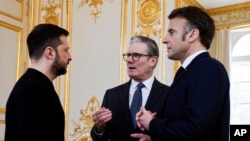
Leaders from more than 30 countries met in Paris for talks about to how to firm up Ukraine's position on and off the battlefield as they promised new aid and considered proposals on the potential deployment of European forces in the country to complement a future cease-fire or peace deal.
Following the March 27 "coalition of the willing" summit, which does not include the United States, French President Emmanuel Macron said that the leaders gathered in Paris were more united around Ukraine than ever before. He said they need to ensure that they're able to counter what he described as Russia's plan to draw out the negotiating process in order to grab more land.
"Our target is clear," Macron said at a press conference after the summit. "It is to achieve peace -- and to do this, we need to get Ukraine in the best possible place."
The French president said that foreign ministers of coalition countries were tasked following the summit with looking at specific legal questions over any European-led reassurance force supporting a cease-fire, and told to report back in three weeks.
"There will be a reassurance force operating in Ukraine representing several countries," Macron said. "It is not Russia that can decide if a reassurance force can be stationed in Ukraine."
He added that there is currently no unanimity on sending a European-led force and that not all members have agreed to participate, but he said that this not required in order to move ahead.
Speaking with Ukrainian President Volodymyr Zelenskyy on the eve of the summit, Macron said that the proposed reassurance force would not be on the front lines of the war and would not be tasked with monitoring or enforcing a cease-fire -- a job that he suggested could fall to UN peacekeepers.
At the March 27 press conference, Zelenskyy said that there were "many questions" and "few answers" over the possible deployment of European-led troops in Ukraine as part of any agreement.
"As for the actions of this contingent, its responsibilities -- what it can do, how it can be used, who will be in charge of it -- there are many questions. So far, there are few answers," Zelenskyy said.
Zelenskyy also urged the United States to respond to what he called Russia's violation of a commitment not to strike Ukrainian energy targets.
The Ukrainian leader said that energy infrastructure had been damaged in a Russian attack on March 27 and that it was "unclear who is monitoring" the pledges to halt such strikes.
Ukraine and Russia have traded accusations over breaching separate agreements with the United States to pause strikes against each other’s energy facilities.
Reaffirming Support For Ukraine
During the press conference, Macron added that a number of countries involved made further commitments of aid to Ukraine, including the French announcement of a new military aid package worth 2 billion euros ($2.1 billion) on March 26.
Macron also said that European leaders had agreed not to ease sanctions imposed on Russia and that they would take additional measures to target Russia's so-called shadow fleet, a network of aged tankers used to covertly carry Russian crude oil around the world.
Earlier this week, separate US talks with Kyiv and Moscow in Saudi Arabia led to the announcement of a deal that the White House said resulted in a cease-fire in the Black Sea and an agreement "to develop measures for implementing" their commitments to halt strikes on energy facilities.
But Russia is also demanding a number of conditions be met before it abides by the Black Sea agreement, including an easing of sanctions.
Macron said following the summit in Paris that he intends to speak to US President Donald Trump and praised the recent US diplomacy.
Whether the plans will result in action on the ground and be integrated into diplomatic talks spearheaded by Washington remains to be seen.
Steve Witkoff, Trump's special envoy who has been involved in talks with Russia and Ukraine, earlier this week called the idea of the coalition “simplistic” and “a posture and a pose.”
Macron was asked about Witkoff’s criticism during his press conference and said that "we must hope for the best, but prepare for the worst," adding that he hoped that the United States would back the initiative but that his focus was on what Europe can do.
Easing Sanctions On Russia And A Black Sea Deal
US officials have recently raised the prospect of easing their set of sanctions on Russia.
Speaking to reporters during a working visit to Jamaica, US Secretary of State Marco Rubio said Washington will assess Moscow’s conditions.
"We're going to evaluate that. Some of those conditions include sanctions that are not ours -- they belong to the European Union," Rubio said at a news conference in Jamaica on March 26.
US Treasury Secretary Scott Bessent said in an interview with Fox News on March 26 that he believed Trump "would not hesitate to tighten sanctions if it gives him an advantage in negotiations." He added that tightening or easing sanctions would depend on further actions by the Russian leadership.
Meanwhile, in Ukraine, at least 11 people were injured in overnight drone strikes on the Ukrainian cities of Kharkiv and Dnipro on March 26, causing extensive damage.
Officials reported that Russian forces launched at least 86 Shahed drones at the two cities, hitting civilian buildings and vehicles.
Why RFE/RL Matters
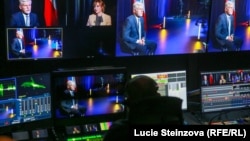
Welcome to Wider Europe, RFE/RL's newsletter focusing on the key issues concerning the European Union, NATO, and other institutions and their relationships with the Western Balkans and Europe's Eastern neighborhoods.
I'm RFE/RL Europe Editor Rikard Jozwiak, and this week I'm going to talk about something a bit different: our work at RFE/RL.
The Briefing: Radio Free Europe And Me
Readers of the Wider Europe newsletter have likely noticed the uncertain times facing Radio Free Europe/Radio Liberty (RFE/RL) at the moment. On March 15, US President Donald Trump signed an executive order drastically reducing the size of RFE/RL's overseer, the United States Agency for Global Media (USAGM). That was followed by a letter from Kari Lake, a senior adviser to the USAGM CEO, notifying that the Congress-approved grant that funds us has been terminated.
Despite this, we are still operating. The radio has sued both USAGM and Kari Lake over these moves, and there has been talk of possible funding from the EU.
Given the circumstances, I’m going to break from the usual format and share a story I’ve never written down before -- about what RFE/RL means for me.
Behind The Iron Curtain
My father was born in Poznan, in western Poland, in 1939, just before the Nazi German invasion. With his father serving in the Polish army and later taken as a prisoner of war and his mother imprisoned for resisting the Nazi regime, my father spent most of the war in the care of his older brother and a Swedish Red Cross nurse -- a connection that proves significant later on.
After the war, my grandparents and their young son -- my father -- moved to the northern Polish port city of Gdansk in search of better job prospects. At this point in time, Sweden had one of Europe’s biggest merchant fleets and, against the grim backdrop of war-ravaged Poland, their gleaming ships in the harbor made quite an impression on my father.
Like many people stuck behind the Iron Curtain, my father listened to “the voices” -- that was what people called radio broadcasts from the BBC World Service, Voice of America, and Radio Free Europe. People listened secretly, of course, holding a transistor radio up to their ears in bed at night. They were dark times, with censorship and crackdowns, but for my father those broadcasts were a godsend. They informed and they inspired, and, in my father’s case, convinced him to flee -- to the West, to Sweden.
Crossing The Icy Sea
His first attempt, when he was 17, was to try to walk from Poland across the ice-covered Baltic Sea to reach the Danish island of Bornholm. The plan was then to continue to Sweden. Winters were much harsher in those days and ice really did cover large parts of the Baltic, but it was still a foolhardy plan. Icebreaker ships made crossing on foot almost impossible and he was forced to return -- beaten but not discouraged.
The next year, he tried again, this time attempting to canoe across the sea with a friend. The teenage boys were caught by a Polish ship and turned over to the authorities. Instead of Scandinavia, they ended up in a prison cell back in Poland. Interrogated and beaten, they admitted to being CIA spies and got sentenced to 10 years.
Luckily, in the late 1950s, there were liberal reforms under way in Poland, and they were released after a year. With my father's dream of a life in the West now on hold, he got an education and met my mother. They married and both secured jobs in what were then the Lenin shipyards in Gdansk. Through all that time, he still listened to "the voices," the jazz, the rock 'n' roll that managed to escape the jammers.
Third Time Lucky
My parents' dreams of a new life abroad resurfaced, and, in 1971, they went to Yugoslavia, one of the few countries they could travel to at the time. On a beach in Pula, in today's Croatia, they saw a German couple that reminded them of themselves. The man was dark-haired like my father; the woman was blonde like my mother.
With nothing to lose, they walked up to them and asked if they were from West Germany, which they were. They then made a request so bold I still can’t quite believe how they had the audacity: they asked the German couple if they could take on their identities. And, astonishingly, the Germans said yes. (Apparently helping “easterners” in such a way was not uncommon during the Cold War.)
So, with the couple's IDs and also their car, they drove over the border to Italy. The German couple then went to the closest consulate saying that they had been mugged. After a year as political refugees in Italy, they were allowed to go to Sweden to seek residency and later citizenship.
Because of the war, my father grew up hating Germans -- so it was a sweet irony that the act of supreme generosity that gave him his freedom came from a German. They stayed in touch, sending the German couple a card every Christmas.
Closing The Circle
I was born in Sweden in the 1980s, in the peace and prosperity my parents could only dream of when they were young. Like many others from my generation, I studied abroad, spoke a few European languages, and traveled freely and widely across the continent, believing in the idea of a “common European space.” So it made a certain sense when I ended up in Brussels.
When I got an offer in early 2011 to try out as a freelance Brussels reporter for RFE/RL, I knew it was no ordinary job offer. After being brought up on tales of RFE/RL’s significance, I felt like I was closing a family circle.
When I started, in early 2011, the big news was the fraudulent presidential election in Belarus that had taken place in December the previous year and the subsequent crackdown of demonstrators taking to the streets. The EU was imposing sanctions on Aleksandr Lukashenko’s regime, and I threw myself into reporting the story from Brussels. I've been reporting about the EU and NATO ever since.
Some things never change. Today (March 25), Lukashenko is being inaugurated for his seventh term and he is still facing EU sanctions. Under his repressive rule, there are an estimated 1,500 political prisoners in the country. One of them is my colleague, RFE/RL journalist Ihar Losik, who has been behind bars since 2020. Another colleague, Andrey Kuznechyk,was released earlier this year from a Belarusian prison.
When I think of Ihar and Andrey -- along with Vladyslav Yesypenko, an RFE/RL contributor who is jailed in Russia-occupied Crimea -- I can't help thinking of my father’s story and everything he did to live a free life.
We reach some 50 million people each week in places where media freedom doesn’t exist, is severely tested, or in environments flooded with disinformation. RFE/RL still matters, just as it did for my parents back in communist Poland. Just as it does for Andrey, Ihar, and Vladyslav -- and all the people they reached.
Feel free to reach out to me on Twitter @RikardJozwiak, or on e-mail at jozwiakr@rferl.org.
Until next time,
Rikard Jozwiak
If you enjoyed this briefing and don't want to miss the next edition subscribe here.
Could The EU Become A Military Superpower?
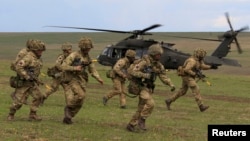
Welcome to Wider Europe, RFE/RL's newsletter focusing on the key issues concerning the European Union, NATO, and other institutions and their relationships with the Western Balkans and Europe's Eastern neighborhoods.
I'm RFE/RL Europe Editor Rikard Jozwiak, and this week I'm drilling down on one issue: defense and the EU.
The Briefing: Could The EU Become A Military Superpower?
Only two weeks after a European Union summit where the bloc's leaders pledged to spend billions on defense in a "watershed moment for Europe," they are returning to Brussels for another meeting on March 20-21. This time, the EU's leaders aim to solidify plans for strengthening Europe's defense autonomy amid ongoing doubts about the US commitment to protecting European nations and sustaining military support for Ukraine.
In the runup to the summit, the bloc's foreign ministers on March 17 talked about EU foreign policy chief Kaja Kallas's latest proposal to find money for Kyiv. And on March 19, the European Commission is set to unveil a white paper on the future of European defense. The paper is expected to come up with ideas on how to create a proper integrated European defense market and to flesh out the proposal, made in the European Commission's ReArm Europe plan, where the EU executive would generate up to 800 billion euros ($872 billion) for defense spending over the next four years.
As always in Brussels, there are doubts about how credible all this really is. Diplomats I have spoken to agree that it's a good first step, but, as one senior EU official told me, "The devil is always in the details, and there are plenty of devils here."
Looking closer, it does seem that the 800 billion figure is very ambitious with lots of big ifs. If -- and how quickly -- this proposal can be translated into new weapons and ammunition. And if any of those weapons will make it to Ukraine.
The facts are clear. The EU defense commissioner, Andrius Kubilius, noted in the European Parliament last week that Europe currently has a defense shortfall of at least 500 billion euros, and is lacking "thousands of tanks and armored vehicles."
European Union Commission President Ursula von der Leyen, also addressing the Strasbourg chamber, noted that, on average, EU countries contributed just short of 2 percent of gross domestic product (GDP) on defense. Washington is pushing for 5 percent, whereas NATO, according to sources within the military alliance, is toying with the idea of making 3.7 percent the official target at its official Hague summit in June.
Still, even if there is a substantial and rapid increase in defense spending, privately European diplomats say it could take a decade for Europe to carry out major military operations without US help. In Europe at the moment, intelligence, surveillance, target acquisition, and reconnaissance are almost all exclusively provided by the United States.
Rearming Europe?
ReArm Europe aims to address the EU's dependency on the United States by making EU nations increase their defense budgets. But will they? Of the 800 billion euros Von der Leyen is hoping to generate, 650 billion euros could be raised by relaxing defense spending regulations for EU member states over the next four years. This proposal would permit each member state to allocate an additional 1.5 percent of their GDP toward military expenditures. While this extra fiscal space is welcomed, few believe all capitals will use it.
The remaining 150 billion euros are a loan scheme secured against unused EU budget funds that 20 countries in the bloc, without triple-A credit ratings, can use. These loans should finance purchases from European defense producers, although it's not clear if all the components in such equipment need to be from EU countries, or if they could come from non-EU states such as Norway, Switzerland, and Turkey.
The problem here is that it is still a loan and many of the countries, notably in southern Europe, that need to increase their defense spending are heavily indebted. Also, some northern EU states are questioning the logic of this proposal, with the Dutch parliament recently and narrowly passing a nonbinding resolution to reject the ReArm Europe plan with the argument that it just gets the bloc into even more debt.
Then there is the third part of Von der Leyen's proposal, which would allow member states to use for defense the more than 300 billion euros funds left in the EU budget that normally would go to the bloc's poorer regions for infrastructure investment. The issue here, once again, is that it is voluntary. And that means that while it can't be blocked by Russia-friendly countries such as Hungary and Slovakia, as it doesn't require unanimity, some countries just won't bother, unless they're forced.
Bonds And Bazookas
Then there is Germany. The incoming chancellor, Friedrich Merz, has promised a real "spending bazooka," which includes a proposal that defense spending above 1 percent of GDP be exempted from the restrictions of Germany's constitutional debt brake. At the moment, the brake limits the structural budget deficit to 0.35 percent of GDP, except in emergencies.
This could unlock a German defense splurge of billions and is something that is generally welcomed in Brussels. Not quite so much in other European capitals, where there are fears Germany will spend most of it on its own domestic firms and create something of an unfair advantage.
This could, in turn, potentially trigger renewed calls from southern European states for Brussels to issue joint eurobonds, especially for defense investment. A similar thing was done to combat the Continent-wide recession after the coronavirus pandemic. Issuing joint bonds is anathema for most northerners, notably the Netherlands and Germany, but with Berlin clearly indicating that splurging on defense is a must, the proposal may eventually fly.
Military Mobility And The Danish Model
Eurobonds, or "defense bonds" as they are now being rebranded, are likely to make it into the European Commission's white paper on the future of European defense. But the things to really look out for here are some of the nitty-gritty proposals on military mobility. It may not seem like the most urgent thing, but EU officials are pointing out how important it is to be able to quickly move military equipment from one EU member state to another.
As it stands now, that wouldn't be easy. There are no harmonized rules across the bloc on, for example, moving military vehicles from one EU country to another in the event of an emergency. Initiatives such as strengthening bridges, railways, and roads to be able to carry heavier military loads are also suggested in the paper.
Another aspect likely to be included is the idea to integrate Ukraine's defense market into the EU market as the country slowly but steadily is moving toward membership of the union. This is seen by many European diplomats as a real win for the EU, as Ukraine now in fact boasts perhaps the Continent's most capable army and is "ahead of the curve compared to the rest of us on things like military drones," as one EU official familiar with the matter told me.
The document will, in this respect, also promote the so-called Danish model of supporting Ukraine. This approach involves EU member states directly procuring defense equipment manufactured in Ukraine or establishing joint ventures with Ukrainian defense companies. The idea of training Ukrainian soldiers in Ukraine and not only in the EU is also being put forward.
Helping Ukraine
But these plans are all for the future, and the question remains what Brussels can do for Ukraine right now. Kyiv has indicated that it may need as much as 33 billion euros of additional military support this year. With the United States possibly not contributing much to this, the EU needs to find most of that cash urgently.
EU foreign policy chief Kaja Kallas put forward a new plan to EU member states last week, seen by RFE/RL, which proposes a voluntary scheme that encourages participating states to "deliver military support to Ukraine in 2025 with a provisional value of at least 20 billion euros and potentially reaching 40 billion euros pending Ukrainian needs."
The text gives a deadline of April 30 for those participating to declare how they plan to meet their respective contributions and states that payments should be committed no later than June 30 to ensure deliveries by the end of this year.
The plan says this money should mainly go to large-caliber artillery ammunition, air-defense systems, missiles, drones, fighter jets, and training of Ukrainian troops. It should also support other contributions from member states, for example, sending troops to Ukraine in the event of a peace deal.
The paper still suggests countries should contribute based on their economic weight, meaning gross national income (GNI). This idea has previously angered France, which claims that trackers of military support for Ukraine such as the Kiel Institute for the World Economy are wrong, and that Paris does many things in secret and is also willing to send actual boots on the ground in Ukraine to safeguard a potential future cease-fire.
Looking Ahead
On March 19, the European Commission will come up with an action plan on how to help the steel industry in the European Union. This would normally not trigger too much interest, but now it's a different story as the United States on March 12 announced it was slapping a 25 percent tariff on steel (as well as aluminum) imports from the bloc. The bloc will roll out countermeasures in April, but the fear is that a full-scale transatlantic trade war will break out, causing severe damage to many sectors of the EU's economy.
That's all for this week! Feel free to reach out to me on any of these issues on Twitter @RikardJozwiak, or on e-mail at jozwiakr@rferl.org .
Until next time,
Rikard Jozwiak
If you enjoyed this briefing and don't want to miss the next edition subscribe here .








